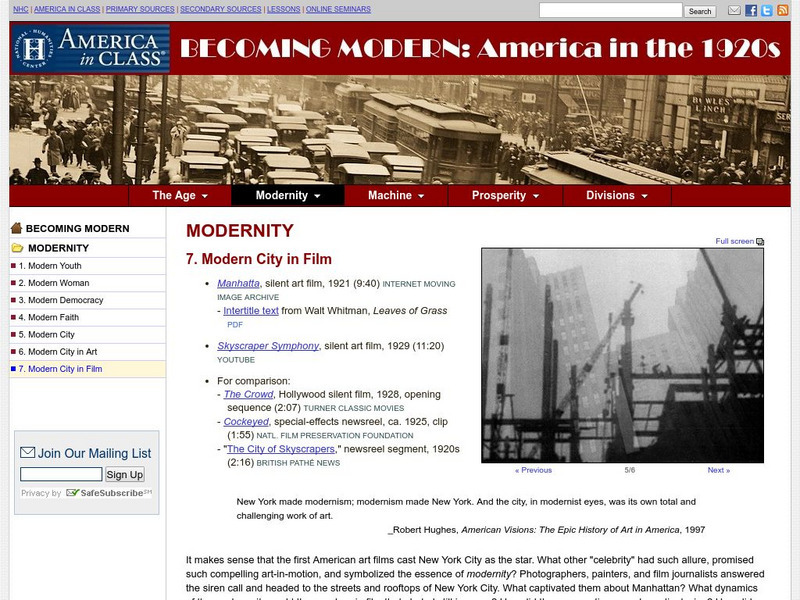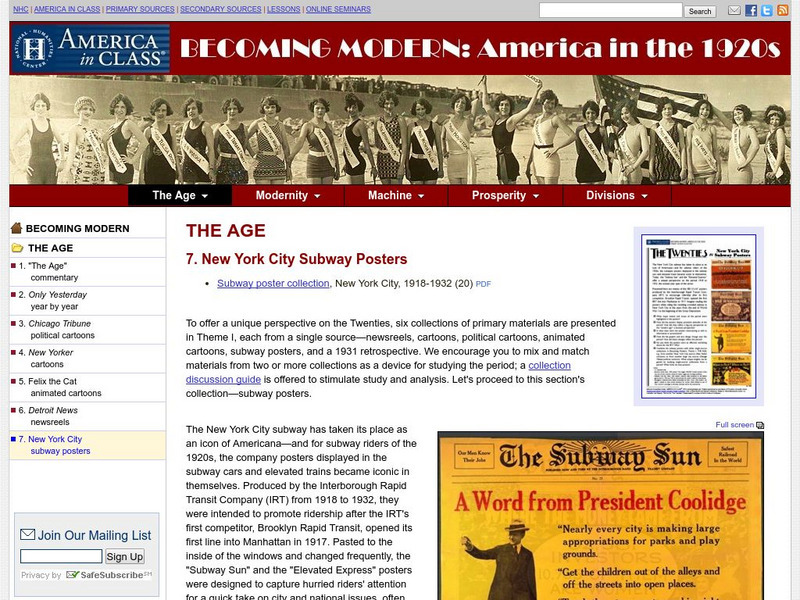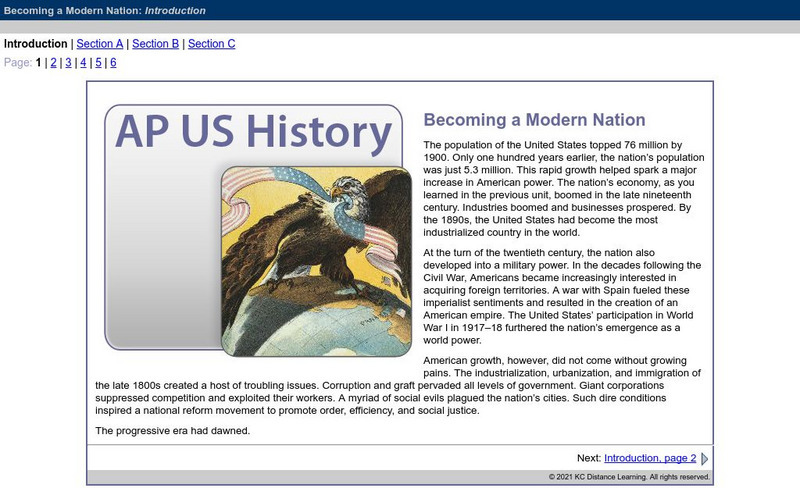Hi, what do you want to do?
Curated OER
Thank You, Mr. Edison
Young scholars read a letter to Thomas Edison and search for advertisements of the period. They review primary sources and photographs of items made available in the 1920's. They interact on the American Memory Collection website.
Curated OER
Music and Art of the Harlem Renaissance
The music of the Harlem Renaissance can provide a way for students to learn about musicians like Dizzy Gillespie and Louis Armstrong.
Curated OER
The Great Migration
What a terrific lesson! Have your class learn about immigration using this resource. Fourth graders discuss the Great Migration in Ohio through art, writing, and discussion. Afterward, they create a presentation in which they tell their...
Curated OER
Jews in America at the Time of Growth and Change: Forging New Frontiers
Tenth graders examine the role of Jewish Americans in the 1900s. They examing the changes in industry and inventions. They also identify how Jewish Americans changed society and religious organization.
Scholastic
Marijuana: Breaking Down the Buzz
There are a lot of myths surrounding marijuana. Read a passage that clarifies the dangers of teens smoking marijuana, its harmful effects on the development of the brain, and the possible correlation of cigarette smoking to marijuana...
Alabama Department of Archives and History
Cells for Sale - Convict Leasing in Alabama
The benefits and drawbacks of convict leasing following the Civil War are the focus of a lesson that asks groups to examine primary source materials to gain an understanding of the program before individuals decide whether they...
Curated OER
Lesson 6: Crowded Skies
This is a treasure-trove of multimedia resources to help your scholars analyze transportation methods. They discuss different forms of movement, utilizing several infographics to spur conversation deeper and get visual learners engaged....
Curated OER
Reading Comprehension 1: Level 9
The Iditarod Trail and the Iditarod Trail Sled Dog Race are the focus of a comprehension assessment. Readers must identify the main idea of the passage, draw inferences, define words using context clues, and identify the organizational...
Curated OER
American Music Styles - Lesson 1
Students describe some of the distinguishing characteristics of rock, folk, blues, and country music. They identify two main musical roots of today's American popular music.
Curated OER
Ybor City Historic District
Students analyze the role cigar making played in Ybor City. They examine how cigars are made and the different societies who helped immigrants keep their identify. They compare and contrast their own community to Ybor City.
Curated OER
On the Line
Students view a television program that traces the use of the assembly line in mass production and the subsequent conflict between workers' rights and management. They analyze and discuss the portrayal of the American worker over time...
Curated OER
F. Scott Fitzgerald: The Great American Dreamer
Students explore how F. Scott Fitzgerald was one of the most important writers of the twentieth century. In novels such as Tender is the Night, This Side of Paradise, and The Great Gatsby, he captured the mood and manners of his time.
Curated OER
"Television"
In this reading comprehension activity, students read a text about the beginnings of television. Students answer 10 multiple choice questions.
Curated OER
To Tell the Truth: Will the Real Warren G. Harding Please Step Forward!
Tenth graders play the role of historians, working to become experts on Warren G. Harding's private and public life. They become contestants in a simulation of the popular 1970s television show "To Tell the Truth".
Curated OER
Paul Robeson: The Renaissance Man
Students research the life of athlete, actor, singer, cultural scholar, author, and political activist, Paul Robeson. They answer the question, "Which was most important to American culture -Robeson's work as a scholar, a performer, an...
Curated OER
Roll the Union On: the National Labor Relations Act and the Rise of the Congress of Industrial Organizations (CIO)
Students examine the many different programs Roosevelt created as a result of the Great Depression. They research the National Labor Relations Act and explore what working conditions were like during that time.
Curated OER
The Dust Bowl and the Ogallala Aquifer
Students research the characteristics of the Great Plains as an agricultural area. They examine farming techniques from the past and how those farming techniques are used today. They investigate the present uses of the Ogallala Aquifer.
Georgia Department of Education
Ga Virtual Learning: Ap Us History: 1920s, the Great Depression, & World War Ii
AP U.S. History learning module on 20th Century eras and events including the 1920s, Great Depression, and World War II. Comprehensive multi-media lesson materials.
National Humanities Center
National Humanities Center: America in Class: America in the 1920s: Modern City in Film
The National Humanities Center presents collections of primary resources compatible with the Common Core State Standards - historical documents, literary texts, and works of art - thematically organized with notes and discussion...
National Humanities Center
National Humanities Center: America in Class: America in the 1920s: Modern City in Art
The National Humanities Center presents collections of primary resources compatible with the Common Core State Standards - historical documents, literary texts, and works of art - thematically organized with notes and discussion...
National Humanities Center
National Humanities Center: America in Class: America in the 1920s: New York City Subway Posters
The National Humanities Center presents collections of primary resources compatible with the Common Core State Standards - historical documents, literary texts, and works of art - thematically organized with notes and discussion...
Virginia History Series
Virginia History Series: Virginia State History 20th Century (1921 1940) [Pdf]
The Roaring Twenties was a time of great prosperity in America and Virginia. However, it ended with a bust that shook our country to its core. Imagine the culture of this time with the help of pictures, charts, and maps. This slideshow...
Department of Defense
Do Dea: Ap Us History: Unit 6: Becoming a Modern Nation
This extensive learning module examines the role of large-scale industrialization, urbanization, and mass migrations in creating new demands on government and social organizations to design reforms, and looks at the global and domestic...
National Humanities Center
National Humanities Center: America in Class: America in the 1920s: Machine: Movies
The National Humanities Center presents collections of primary resources compatible with the Common Core State Standards - historical documents, literary texts, and works of art - thematically organized with notes and discussion...


























![Virginia History Series: Virginia State History 20th Century (1921 1940) [Pdf] PPT Virginia History Series: Virginia State History 20th Century (1921 1940) [Pdf] PPT](https://static.lp.lexp.cloud/images/attachment_defaults/resource/large/FPO-knovation.png)

